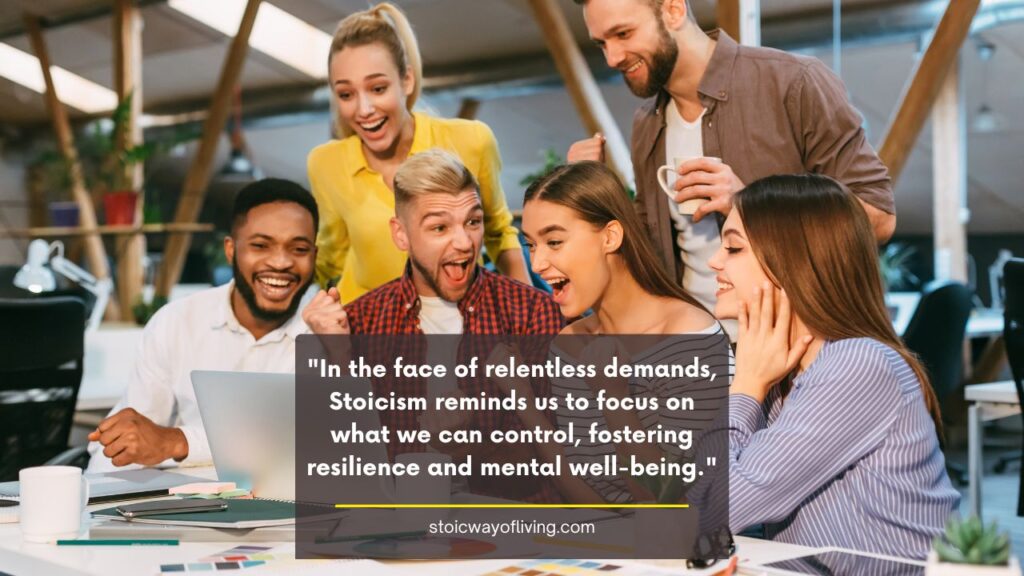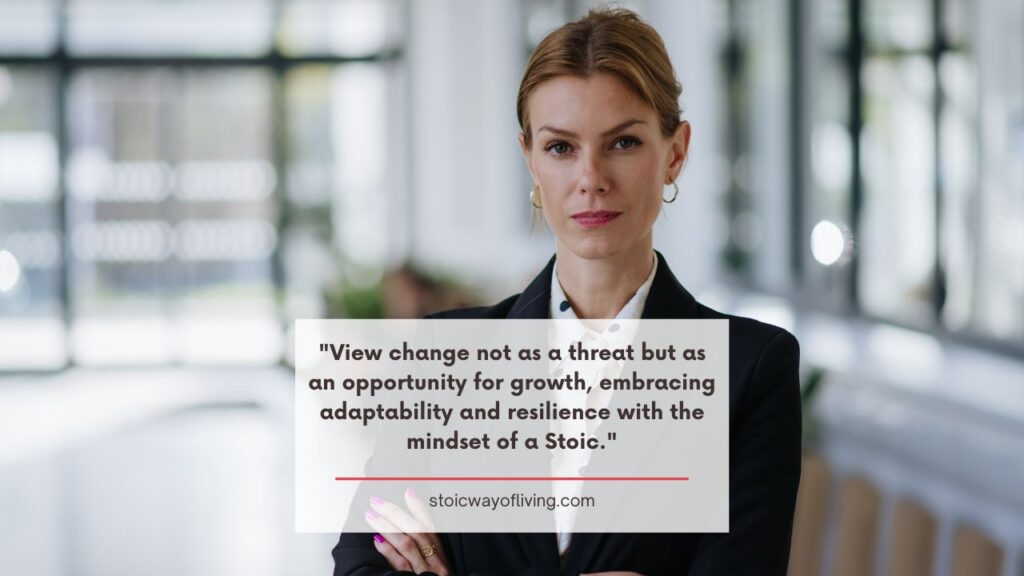Overcoming workplace challenges with stoicism in today’s fast-paced and often tumultuous work environment is a necessity.
Finding effective ways to manage work stress and overcoming obstacles can be incredibly beneficial in maintaining both productivity and well-being.
This article explores how Stoic principles can be applied to modern professional settings, helping individuals maintain resilience, clarity, and peace of mind amidst daily pressures.
Understanding Stoicism

Stoicism is a philosophy that teaches self-control and fortitude to overcome destructive emotions. It emphasizes the importance of reason, logic, and control over one’s inner life.
The core principles include:
- Focusing on what can be controlled.
- Virtues such as wisdom and courage.
- Advocating for emotional detachment to maintain a rational perspective.
Overcoming Common Workplace Challenges with Stoicism

Navigating the complexities of the modern workplace often involves dealing with stress, difficult colleagues, high workloads, and constant change.
Stoicism provides a valuable toolkit for addressing these challenges, fostering resilience, clarity, and well-being.
Stress and Burnout
Stress and burnout are rampant in modern workplaces, fueled by high demands and continuous pressures.
Symptoms include chronic fatigue, decreased performance, and a sense of disengagement.
Stoicism offers tools to manage these stresses by promoting a focus on what can be controlled and fostering a mindset of acceptance and resilience.
By re-framing our perspectives on stressors, we can mitigate their impact and maintain our mental well-being.
Difficult Coworkers and Managers

Interpersonal conflicts are inevitable in any workplace.
Difficult coworkers or managers can create a toxic environment that hinders productivity and job satisfaction.
Stoicism teaches us to manage our reactions to these individuals, focusing on our own behavior rather than attempting to change others.
We can navigate these relationships more effectively by practicing patience, empathy, and clear communication.
High Workload and Tight Deadlines
A high workload and tight deadlines are familiar sources of stress in the workplace.
These challenges can lead to feelings of overwhelm and anxiety. Stoicism encourages breaking down tasks into manageable parts and focusing on one thing at a time.
Maintaining a disciplined approach and avoiding unnecessary distractions can improve productivity and handle pressure more effectively.
Change and Uncertainty

Change and uncertainty are constants in the workplace, whether due to organizational shifts, new technologies, or market dynamics.
Stoicism teaches us to view change not as a threat but as an opportunity for growth.
By embracing adaptability and resilience, we can navigate transitions smoothly and leverage them for personal and professional development.
Applying Stoic Principles to Workplace Challenges

Applying Stoic principles in the workplace offers timeless wisdom and practical tools to help manage stress, improve decision-making, and foster a positive work environment.
Here are some essential Stoic principles that you should implement in your daily life:
Dichotomy of Control
The dichotomy of control is a fundamental Stoic principle emphasizing distinguishing between what we can and cannot control.
In the workplace, this means focusing on our actions, responses, and attitudes rather than external events or the behaviors of others.
By applying this principle, we can reduce stress and frustration, concentrating our efforts on what we can influence and accepting what we cannot.
Emotional Detachment

Emotional detachment, in Stoic terms, means observing our emotions without letting them dictate our actions.
This is particularly useful in high-stress environments where emotional reactions can lead to poor decision-making.
By practicing emotional detachment, we can maintain a calm, rational approach and make better choices under pressure. This doesn’t mean ignoring emotions but understanding and managing them effectively.
Maintaining a Proper Frame of Mind
Stoics believe in maintaining a proper frame of mind, focusing on positive and rational thoughts.
This involves regularly reflecting on our values and goals and ensuring our actions align with them.
This helps stay focused and motivated in the workplace, even when faced with challenges. Techniques such as mindfulness and regular reflection can aid in cultivating a resilient and positive mindset.
Simplifying Tasks
Simplifying tasks is a Stoic strategy for managing workload effectively.
This involves breaking down complex projects into smaller, manageable steps and tackling them one at a time.
Focusing on completing each task methodically and avoiding unnecessary complications can improve our efficiency and reduce feelings of overwhelm.
This approach helps maintain clarity and ensure steady progress.
Cultivating Gratitude and Mindfulness

Gratitude and mindfulness are essential Stoic practices that enhance well-being and productivity.
Practicing gratitude shifts our focus from what is lacking to what we have, fostering a positive outlook.
Mindfulness helps us stay present and fully engaged in our work.
Integrating these practices into our daily routine can create a more fulfilling and balanced work environment.
See also: Practicing Stoic Detachment in Self-Reflection – All You Need to Do!
Conclusion
Stoicism offers valuable principles to help navigate workplace challenges more efficiently and effectively.
Focusing on what we can control, maintaining emotional detachment, and simplifying our tasks can significantly improve our productivity and job satisfaction.
Additionally, cultivating gratitude and mindfulness enhances our overall well-being. Adopting a Stoic mindset is a journey that requires consistent practice and self-reflection, but the rewards for personal and professional growth are well worth the effort.
For those looking to dive deeper into managing work stress and overcoming the challenges of a toxic workplace, consider reading “Conquering Burnout in a Toxic Workplace” by Alison Flickinger. This comprehensive guide provides groundbreaking insights and powerful techniques to help you break free from the soul-crushing cycle of stress, find a renewed sense of purpose, and thrive professionally. Check it out on Amazon!


